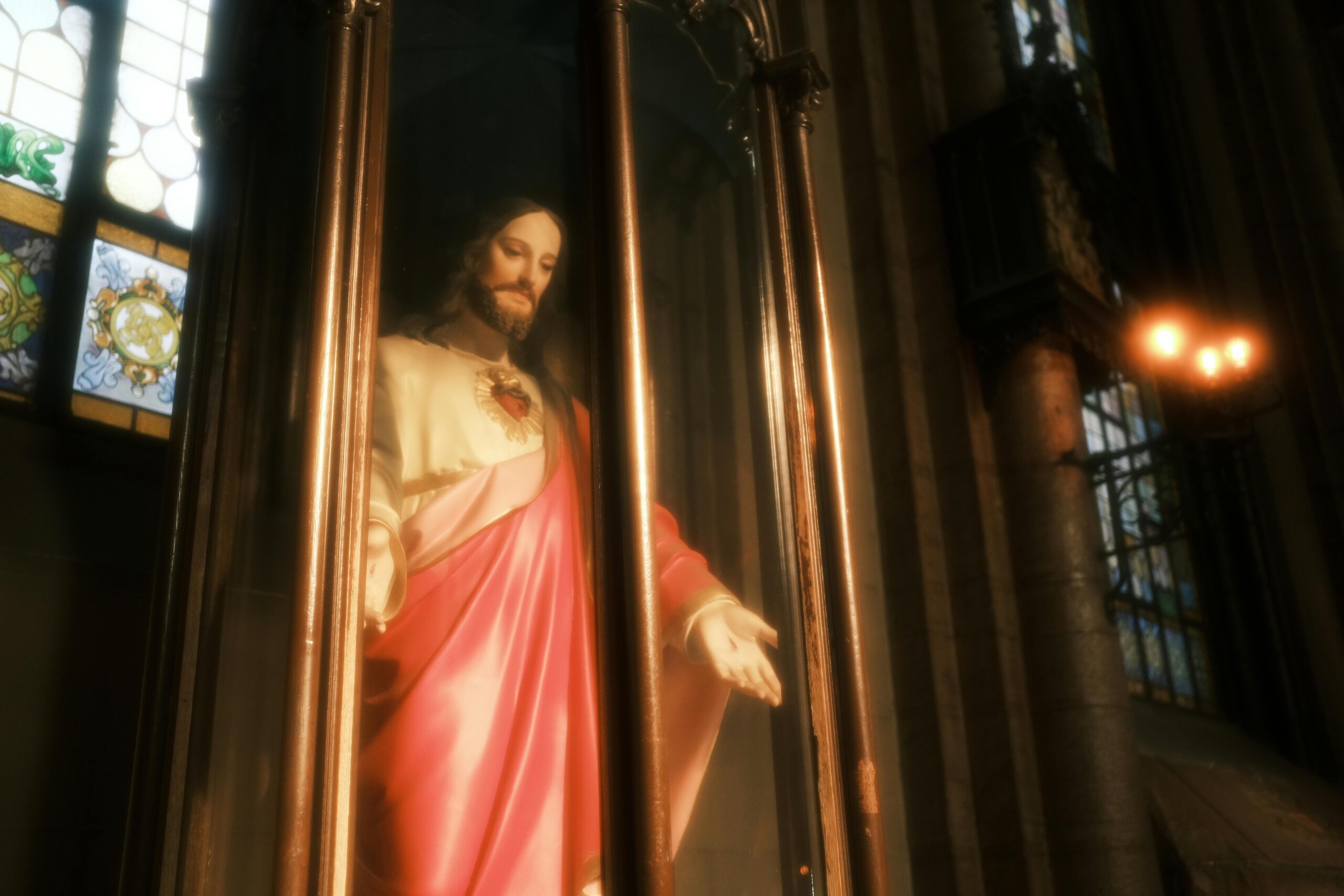Pope Francis published his fourth encyclical, “Dilexit nos,” (“He Loved Us”), earlier this year, a meditation on the “human and divine love of the heart of Jesus Christ.” Reading “Dilexit Nos” was a spiritual experience for me. It prompted me to think about my grandmother’s devotion to the Sacred Heart and how this impacted the development of my faith. While reading the document, I remembered a particularly intense moment in my history when I believed that I might never be able to reconcile the spirituality of my childhood with my sexual orientation.
First, some background on the encyclical.
The document is less directly political than his previous encyclicals “Laudato Si’” and “Fratelli Tutti,” but no less meaningful. In the text, the pope traces the history of the heart as a symbol, from the ancient Greek understanding of the heart as a unifying force to the development of the Sacred Heart devotion in Christian monastic spirituality and church teaching.
The encyclical was released 350 years after the French nun St. Margaret Mary Alacoque experienced visions of the Sacred Heart of Jesus, which were later spread by St. Claude la Colombiere and other Jesuits, eventually leading to the devotion in its contemporary form. While exploring the roots of the devotion, Francis rediscovers the spirituality of the heart as a tool for finding inner unity in the era of artificial intelligence and algorithms, warning that technology, excessive individualism and consumerism can lead to a superficial understanding of self.
Alongside citations from literature, philosophy, and theology, the pope includes personal images from his own grandmother’s kitchen that can help a non-theologian like me to connect with the more abstract theological content.
As I read the pope’s encyclical, I was surprised to discover a depth to the devotion that was both practical and applicable to my work as a therapist today.
“No algorithm will ever be able to capture, for example, the nostalgia that all of us feel… when we recall how we first used a fork to seal the edges of the pies that we helped our mothers or grandmothers to make at home” (“Dilexit Nos,” no. 20).
This domestic imagery brought me back to my grandmother’s kitchen and the little Sacred Heart prayer cards that she gifts to guests at her home. I failed to understand that the fundamental message of the Sacred Heart devotion was an outpouring of abundant love. When I was young, those prayer cards seemed more like knick-knacks—the Catholic version of baseball cards—than real spiritual tools. The image of a crown of thorns piercing a bleeding heart capped with flames evoked notions of repetitive prayers that were meant to save my soul in a formulaic, “magical” way.
As I read the pope’s encyclical, I was surprised to discover a depth to the devotion that was both practical and applicable to my work as a therapist today. I repeatedly find such insights in Pope Francis’s writing and speaking, starting with my first encounter with him in an interview with America (entitled, coincidentally or not, “A Big Heart Open to God”).
In Dilexit Nos, I found the section entitled “the heart unites the fragments” to be particularly relevant to the concept of integration, or unifying different parts of the psyche into a cohesive whole: “The heart is also capable of unifying and harmonizing our personal history, which may seem hopelessly fragmented, yet is the place where everything can make sense” (“Dilexit Nos,” no. 19).
An important step to my own integration came during a phase of young adulthood when I was working in New York City and struggling to reconcile a strong pull towards my faith with my ego-driven career and my sexual orientation. I had long known on some level that I was attracted to men, but I resisted putting language to my feelings.
I was, to quote Pope Francis’ encyclical, missing an “an inner principle” to unify these various parts of myself.
These things were on my mind as I walked to see a movie in the West Village. As I crossed the street, a parade float full of dancing men drove by, music pulsing. It was Pride weekend. The men were scantily clad and covered in glitter: the types of gay men that my father warned me about. These days, I might look at a similar scene and see joy and freedom. At the time, my heart sank.
While the word “gay” provided the comfort of feeling less alone, it also evoked what I saw as the stereotype parading before me, an image that simply didn’t cohere with other parts of my identity. I still saw myself as spiritual, traditional and attached to a family who would certainly disapprove. So instead of picking up a rainbow flag and joining the parade, I thought: Is this what I have to be now? I put my headphones on, tuned out the party around me and finished the walk to my movie feeling despondent, surrounded by people but feeling completely alone.
There was an element of internalized homophobia in my reaction, I know now, along with a fear that I might lose essential parts of myself if I began to use this word. During this phase of my life, I was spending time on the internet, where identity is easily reduced to opinions and flags in Instagram bios. I worried I might disappear into what felt like a superficial label. I was, to quote Pope Francis’ encyclical, missing an “an inner principle” to unify these various parts of myself.
It was only when I took my desires to Christ in prayer that I began to see the gifts that lay beyond my simplistic interpretation of a generic label.
In my 20s, I discovered Ignatian spirituality, which invited me to pray with my experience and taught me about the process of discernment. Soon, I found myself on a retreat to explore my vocation.
The day was over and my formal meditations were complete. I put my journal down and pulled a desk chair up to the window of my little retreat-house room. As I looked out at the hills that hovered over the bay near the seaside retreat house, a light from a distant house caught my eye. For some time, I found myself focusing on the light, no more than a sprinkle on a dark hillside. It was one of those moments when prayer sneaks up on you.
My faith is different now than when I first encountered images of the Sacred Heart in my grandmother’s kitchen.
It was an intense time in my retreat. I was praying about vocation, but my relationship with a man kept rising to the surface, in the way that fragmented parts of ourselves tend to do. I engaged with my feelings about the man in a self-limiting way, as a temptation to overcome in order to hear the Holy Spirit. I never considered that my desire for a relationship might be connected to my vocation.
In the moment, I felt moved beyond the limits of my intellect. I imagined myself inside the house with the man. We were hosting a family meal together, our loved ones gathered around the table. Together, we served them food, just as my grandmother had for me and my cousins every Sunday during our childhoods. I could almost hear the sound of the dishes clanking and the room filling with the genial chaos of people talking over one another. Though I was sitting alone in the uncomfortable desk chair of a retreat house room, I felt completely connected to myself, to God and to my loved ones, newly open to what the rest of my retreat might hold.
For the first time, my attractions felt connected to something deeper and relational. This wasn’t just attraction. This was the possibility of love, a love that had something to offer others: home, food, hospitality.
“We see, then, that in the heart of each person there is a mysterious connection between self-knowledge and openness to others, between the encounter with one’s personal uniqueness and the willingness to give oneself to others” (“Dilexit Nos,” no. 18).
That quiet little prayer revealed to me the limits of my own thinking, attached as my thoughts were to online discourse and theological debates. It was only when I let Christ touch that part of me that it started to become my own and integrate with the faith and home life that I value so dearly.
I have discovered the abundant, generous love that the Sacred Heart devotion points us towards in new ways.
“We cannot attain our fulfillment as human beings unless we open our hearts to others; only through love do we become fully ourselves. The deepest part of us, created for love, will fulfill God’s plan only if we learn to love.” (“Dilexit Nos,” no. 59).
My faith is different now than when I first encountered images of the Sacred Heart in my grandmother’s kitchen. Instead of praying with cards and rosaries, I tend to spend my prayer time in silence, looking out of the window at a nearby river with a coffee in my hand. Something about the water seems to open my heart to the possibility of becoming a “guest house” for the movements of the Holy Spirit.
In that quiet space, I sift through my experiences as a gay man, a member of the church, and now, as a husband. I seek guidance as I learn how to love in the “pots and pans” of domestic life. Often, it’s a place where I let go of my initial reactions and find peace in my third, fourth or fifth reactions to the realities of family life. In doing so, I have discovered the abundant, generous love that the Sacred Heart devotion points us towards in new ways, unifying the faith of my past with a faith that continues to mature and evolve.
In the encyclical, Pope Francis warns of the temptation to become attached to superficial knowledge, a grave danger in our fast-paced, technology-driven age. I join him in worrying that our identities are easily reduced to generic labels rather than deep, embodied realities. The former may have their place at the outer layers of our identities, but contemplative devotions can push us deeper, to what Pope Francis calls the “personal core,” where Christ can point beyond our limits to something we might never imagine on our own.




